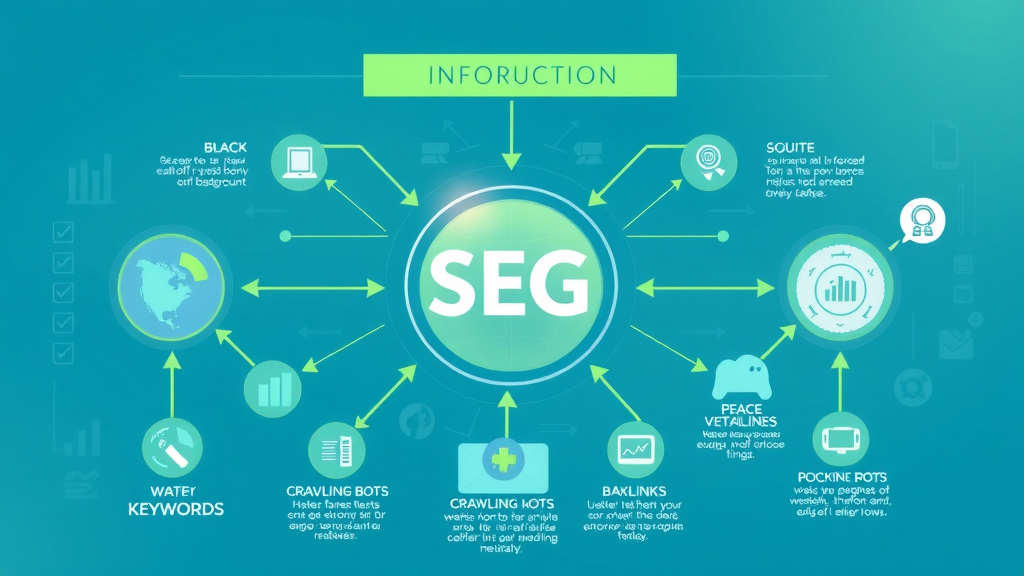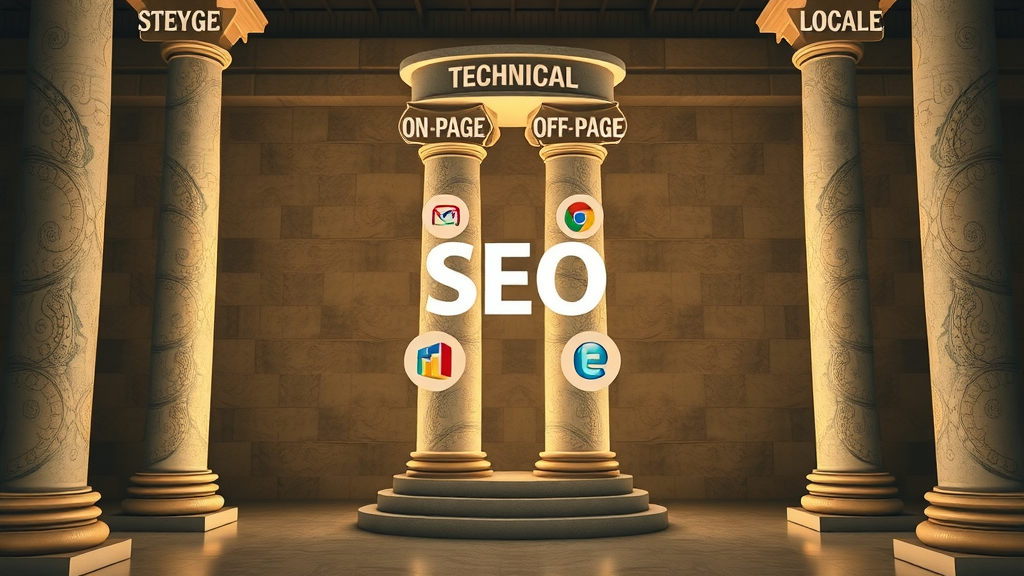Did you know that 93% of online experiences begin with a search engine? If you’re not prioritizing SEO optimization , you’re leaving massive opportunities—and traffic—on the table. In today’s competitive digital landscape, leveraging the latest search engine optimization hacks is not just an advantage, it’s the difference between getting noticed and getting lost. This comprehensive guide will reveal actionable strategies, critical tools, and proven techniques to skyrocket your rankings on Google and beyond—whether you’re a solo entrepreneur, a blogger, or part of a growing business. Get ready to unlock the secrets of search engine dominance!
Did You Know? 93% of Online Experiences Begin with a Search Engine – Uncover the Power of SEO Optimization
The overwhelming majority of web journeys begin with a simple Google search, underlining the vital role of SEO optimization in connecting your website to your target audience. When your site appears high on the search engine results page, you’re vastly more likely to attract relevant clicks, build brand trust, and grow your business. With strategic use of modern seo tools and ongoing optimization, even small businesses and beginners can compete—and rank high —alongside established industry leaders. This makes effective engine optimization not just necessary, but central to your success in the digital arena.
Importantly, the landscape of search engine optimization has changed dramatically. Gone are the days when stuffing a web page with keywords was enough. Today, the focus is on user experience , authoritative content, and leveraging powerful seo tools to identify and capitalize on emerging opportunities. No matter your skill level, adopting the right SEO optimization strategies can rapidly accelerate your website’s visibility and help you connect with ready-to-buy visitors.

- Modern businesses depend on search engine optimization for visibility
- Harnessing SEO tools can rapidly accelerate your website’s reach
- SEO optimization isn’t just for experts—actionable strategies exist for all levels
SEO Optimization: Foundational Concepts for Search Engine Success
Understanding SEO Optimization in 2024: Beyond Search Engine Rankings
SEO optimization in 2024 is more than just about securing a spot on the first results page. It encompasses building a robust digital presence that consistently delivers value to users. Modern search engines, led by Google, now evaluate a wide spectrum of factors, including core web vitals, mobile friendliness, content structure, and technical SEO elements like site speed and accessibility. This holistic approach means that today’s engine optimization strategies must focus on creating exceptional content and seamless site experiences.
Moreover, search engines frequently update their algorithms, making it essential to stay updated with the latest SEO optimization trends and requirements. The process now integrates advanced technologies such as AI, semantic search, and voice-enabled queries. For site owners, understanding these trends—and how they interact with user behavior and search intent—lays the groundwork for campaigns that actually work. The result? Sustainable search engine rankings that withstand algorithm changes and evolving user expectations.
Key Components of Modern Search Engine Optimization
The pillars of contemporary search engine optimization include keyword research , content development, technical SEO, and off-page strategies such as backlink building and social media signals. Effective seo optimization calls for the careful alignment of all these components, ensuring your website ranks high while providing a stellar user experience.
Additionally, optimizing your meta tags , title tags , and meta descriptions ensures your site communicates clearly with both search engine bots and real users. Site architecture, crawlability, and internal linking all play a role, as does consistent tracking of performance using powerful seo tool suites like SEMrush, Ahrefs, or Google Search Console. By synchronizing these efforts, you can consistently outperform your competition in organic search.

SEO Optimization vs. Engine Optimization: Defining Success
While the terms “SEO optimization” and “engine optimization” are often used interchangeably, their distinction matters for long-term results. SEO optimization refers specifically to improving your site’s pages for better search engine rankings, typically through keyword research , content creation, and meta tag refinement. In contrast, engine optimization goes further, ensuring your content is accessible, indexable, and technically aligned with the way search engines process and rank web pages.
Achieving true digital authority means excelling at both. By integrating content, technical, and off-page practices, you establish a foundation that equips your site to meet evolving search engine standards and maximize ranking potential. Ultimately, aligning your optimization approach with the latest practices is key to moving your website above your competitors—and securing consistent visibility across the results pages.
Essential SEO Optimization Strategies to Rank High in Search Engine Results
Effective Keyword Research and Implementation for SEO Optimization
At the core of every winning SEO optimization strategy is data-driven keyword research . The right keywords align your content with real search queries, helping your site rank high for terms your target audience actually uses. Use sophisticated seo tools like Ahrefs or SEMrush to uncover valuable phrases with a balance of good search volume and achievable competition. Don’t stop at one-time research—update and expand your target list regularly to stay ahead of trends.
To implement your keyword research effectively, integrate primary and secondary keywords naturally into your page title, headers, meta description, and body content. Avoid keyword stuffing, as overuse can trigger search engine penalties and negatively impact readability. Instead, focus on answering users’ questions comprehensively, using long-tail keywords and semantically related terms to boost relevance. This approach not only helps boost rankings but also delivers real value to your readers, which search engines increasingly reward.

Meta Description, Title Tag, and Meta Tag Best Practices
The meta description , title tag , and overall meta tags play a pivotal role in attracting both users and search engines. A compelling page title—clear, concise, and keyword-rich—acts as your first handshake with a user on the search engine results page. Your meta description provides a brief yet powerful summary that can boost your site’s click-through rates when it matches user intent.
Each web page you publish should feature a unique and relevant title tag , consistently optimized to reflect the central topic and search intent of its audience. Similarly, refine your meta tags to include primary and supplementary keywords, but ensure that this optimization feels natural and informative, not forced or spammy. Periodically revisit and update these elements as your SEO strategy and keyword focus evolve, keeping your content fresh and competitive in the ever-shifting search landscape.
Technical SEO Optimization: Ensuring Engine Optimization Compliance
Technical SEO is the invisible engine powering your climb up the search engine rankings. Fast-loading pages, proper mobile optimization, clean site architecture, and secure HTTPS protocols are now non-negotiable for digital success. Search engines prioritize sites that are not only accessible but also provide seamless user experiences across all devices.
Leverage tools like Google Search Console to identify and fix crawl errors, duplicate content, and indexing issues. Focus on improving site speed using techniques such as image compression, lazy loading, and streamlined code. XML sitemaps and structured data help search engines better understand your site’s organization, increasing your chances to appear in rich snippets on the results page. Addressing these technical factors ensures that your investments in content and keywords translate into higher engine results and lasting online visibility.
Using SEO Tools for Competitive Search Engine Optimization
Today’s market is flooded with sophisticated seo tools tailored to aid every facet of SEO optimization . From conducting competitor analysis to tracking rankings and uncovering backlink opportunities, the arsenal of digital tools at your disposal is expansive. Leading solutions like Moz, SEMrush, and Ubersuggest provide real-time insights, SEO audits, and actionable recommendations for site improvement.
Leveraging these tools goes beyond surface-level monitoring—dive into keyword gaps, analyze user behavior patterns, and run A/B tests on content changes. Additionally, don’t neglect free options like Google Analytics and Google Search Console for foundational data on search engine visibility. Regular, in-depth use of these platforms empowers data-driven decisions and keeps your engine optimization efforts precise and powerful.
Actionable Hacks: Fast-Track Your SEO Optimization for Higher Rankings
Content Updates and Fresh Keyword Research to Rank Higher
One of the fastest ways to rank higher is to regularly update your web pages and blog posts with current statistics, industry news, and newly researched keywords. Google loves freshness—sites that prove to be timely and authoritative signal ongoing relevance to both the search engine and your visitors. Add new sections, enhance old content, and expand on trending queries to continually improve ranking opportunities.
Varying your keyword research strategy to address emerging search terms and answer new questions is a smart move. Every content refresh presents an opportunity to fine-tune your meta tags , identify internal link opportunities, and address gaps in your content cluster strategy. Over time, these updates compound, strengthening the topical authority of your domain and keeping you top-of-mind—and top-of-search—for your target audience.
Metadata Refinement: Optimize Every Title Tag and Meta Tag
Successful SEO optimization depends on making every element count, especially when it comes to metadata . Scrutinize your meta description , title tag , and supporting meta tags on every single web page . Ask: Do they clearly describe the content? Are your primary keywords present and well-placed? Is there a strong call to action or value proposition that nudges searchers to click?
Monitor performance using your preferred seo tool and experiment with different phrasing, length, and structure. Optimizing these elements not only strengthens your relevance on the search results page but also helps you stand out among competitors with similar offerings. Remember—metadata is an ongoing art, not a one-and-done action.

Technical SEO: Addressing Site Speed, Mobile Optimization & Core Web Vitals
Site speed and mobile responsiveness are now at the forefront of technical SEO . Google’s Core Web Vitals focus intensely on how quickly and smoothly your site loads and interacts—these can be the tipping point between ranking on page one or being buried in the results. Audit your website regularly using tools like PageSpeed Insights and Lighthouse, prioritizing fixes for load times, interactivity, and visual stability.
Equally crucial is optimizing your web pages for mobile users. Responsive design, touch-friendly navigation, and legible text sizes ensure exceptional user experiences that search engines reward. Address technical issues proactively—broken links, duplicate content, and unsecured pages can quickly erode trust and rankings if ignored.

Link-Building & Social Media Integration for SEO Optimization
Solid SEO optimization goes beyond your own site’s borders. Earning high-quality backlinks signals trust and authority to search engines, while linking your content with influential social media channels drives referral traffic and engagement. Both strategies reinforce your relevance and boost your credibility in your space.
Pursue a balanced mix of natural backlinks from reputable sites and sharing across key social platforms. Network with industry leaders, offer to guest post on related topics, and create content that’s inherently shareable—think infographics, expert roundups, or resource guides. Integrating social media into your overall engine optimization strategy amplifies your reach and fuels sustainable organic growth.
Leveraging SEO Tools to Audit, Track, and Enhance Engine Optimization
Continuous improvement is the hallmark of successful SEO optimization . Use a combination of advanced and beginner-friendly seo tools to audit site health, analyze backlinks, monitor keyword movement, and track user engagement across your web pages and blog posts . Regular checks help you spot issues before they escalate and identify growth opportunities where your competition is lagging.
Implement scheduled reviews, automated alerts, and dashboard reporting to put your data to work. Powerful tools like Screaming Frog, Moz Pro, and Google Data Studio bring clarity to your engine optimization efforts—enabling smarter adjustments on the fly and boosting your search engine rankings more efficiently.
| SEO Tool | Main Features | Pricing | Pros | Cons |
|---|---|---|---|---|
| SEMrush | Keyword research, competitor analysis, site audit, backlink checker | From $119.95/mo | Comprehensive, intuitive UI, excellent for professionals | Learning curve, cost for small businesses |
| Ahrefs | Site explorer, rank tracking, keyword explorer, audit tool | From $99/mo | Deep backlink analysis, robust keyword data | Limited features on entry plan |
| Moz Pro | SEO audits, keyword explorer, rank tracking | From $99/mo | User-friendly, strong community, reliable | Smaller index vs. SEMrush/Ahrefs |
| Google Search Console | Site performance, index coverage, search analytics | Free | Essential, free, data direct from Google | Limited depth, lacks competitive data |
| Ubersuggest | Keyword suggestions, traffic analyzer, backlink checker | Free & Paid | Affordable, beginner-friendly, solid insights | Sampling limitations |
The Four Pillars of SEO Optimization: What You Need to Master

Technical SEO – Enhancing Search Engine Accessibility
At the base of reliable SEO optimization is a technically-sound website. This ensures search engine bots can easily access, crawl, and index your content. Tasks like creating XML sitemaps, deploying SSL certificates, fixing crawl errors, and setting up mobile-friendly layouts are crucial for maximizing your visibility in engine results .
Don’t overlook site speed, structured data, and error-free redirects—factors that directly influence how search engines assess and prioritize your web pages. By addressing these fundamentals, your site is primed for both users and search engines, setting the stage for effective content and off-page strategies.
On-Page SEO – Meta Tags, Keyword Research, and Content Optimization
On-page SEO centers around crafting each web page and blog post for maximum search engine friendliness. Your page title , meta tags , internal linking structure, and keyword use all matter here. Conduct thorough keyword research to guide your content plan—and keep your focus on providing valuable, engaging information that stands out from the competition.
Update old content to include new keywords and fresh insights, and ensure your meta description and title tags are always clear, concise, and aligned with search intent. This approach not only drives higher click-through rates but also improves how your content appears in snippets and featured results.

Off-Page SEO – Backlinks and Social Media Influence on Engine Optimization
Off-page SEO determines how the wider web perceives your authority and trustworthiness. Quality backlinks from reputable, industry-specific sites drive credibility and can dramatically improve your search engine rankings . Similarly, active engagement on social media platforms increases brand recognition and can boost direct referral traffic.
Combine guest posting, influencer partnerships, and shareable content with a robust backlink outreach campaign. Emphasize authentic relationship-building and avoid black-hat techniques—search engines penalize manipulative linking practices. When done right, these efforts amplify your engine optimization while protecting your domain’s reputation.
Local SEO – Boosting Your Search Engine Presence Locally
If your business caters to specific regions, local SEO is indispensable. Optimize your Google Business Profile, build consistent local citations, and encourage genuine customer reviews to increase your visibility in local engine results . Focus keyword targeting on location-based terms, and ensure your contact details are clear and consistent across the web.
Implementing local schema markup, using geo-tagged images, and creating content tailored to community interests all help you stand out in local search results. These steps position your business as a trusted, easily discoverable option for high-intent local customers.
"SEO optimization is a continual process, not a one-time project. Staying updated is vital to ranking higher."
Common SEO Optimization Mistakes & How to Fix Them
SEO Over Optimization: What It Is and How to Avoid Search Engine Penalties
A common error is SEO over optimization —when you’re too aggressive with keywords, unnatural link building, or spammy meta tags . This can trigger search engine penalties and tank your rankings. Instead of stuffing every web page with the same keyword, focus on clarity, variety, and adding genuine value. Natural, well-written content wins every time.
Periodically audit your site for keyword density, repetitive anchor text, and irrelevant backlinking tactics. Use trusted seo tools to flag over-optimized areas and adjust your strategy proactively. Remember, the goal is sustainable, gradual growth—not quick wins that risk long-term performance.

Neglecting Meta Description and Title Tag Relevance
Ignoring the power of a well-crafted meta description and title tag can cause your pages to underperform on the search results page, even if your content is strong. Many sites rely on default or duplicate metadata, missing the chance to stand out and attract targeted clicks. Take the time to write unique, compelling meta for each web page .
In your content management system (CMS), regularly review these fields to ensure they are current and tightly aligned with user intent and priority keywords. Consistently managing and optimizing these elements reflects positively in click-through rates and overall rankings.
Ignoring Technical SEO Can Harm Engine Optimization
Neglecting technical fundamentals—like slow page speed, mobile issues, or poorly structured navigation—undermines everything else you do for SEO optimization . These issues can block search engine bots, frustrate users, and put your site at risk of dropping off the engine results pages altogether.
Schedule monthly technical checks with your preferred seo tool and monitor site health closely. Promptly fix broken links, crawl errors, and security warnings. By keeping your technical house in order, you support every other part of your search engine optimization strategy.
FAQs: Demystifying SEO Optimization Techniques
- What is the most important SEO tool for beginners? For beginners, Google Search Console is the most essential SEO tool. It’s free, easy to set up, and gives you real insights on site health, indexing, and how your pages perform in search results. Other options like Ubersuggest offer a gentle learning curve with powerful features.
- How often should SEO optimization be reviewed? You should review your SEO optimization efforts at least quarterly—or more often if you update your website regularly. Algorithm changes, evolving competition, and new search trends make ongoing review and adjustment critical for sustained success.
- Can meta tags significantly impact search engine optimization? Absolutely. Carefully crafted meta tags—including meta descriptions and title tags —directly influence click-through rates and can improve your site’s relevance for key search terms. Keep meta tags concise, on-topic, and unique for every page.
Pro Tips: Advanced SEO Optimization Tactics for Sustained Search Engine Growth
Integrating AI & Automation into SEO Optimization
Artificial intelligence and automation are revolutionizing search engine optimization . Advanced algorithms can now analyze competitor gaps, optimize content structure for topic relevance, and even automate routine SEO audits. Using AI-enhanced seo tools like Clearscope or SurferSEO ensures your strategies are both data-driven and hyper-efficient.
Automation tools can schedule content updates, monitor rankings, and generate performance reports without manual work. Embrace these technologies to focus on growth opportunities and strategic thinking, rather than repetitive optimization tasks.

Voice Search & Mobile SEO Optimization Strategies
As smart speakers and mobile devices become ubiquitous, optimizing for voice search and mobile queries is an advanced necessity. Focus on natural language, long-tail phrases, and local intent in your content and meta tags . Make sure your site navigation is intuitive and that critical information (like address and phone number) is easily accessible to voice assistants and on mobile screens.
Conduct regular mobile usability tests using seo tools and Google’s Mobile-Friendly Test. Responsive design, fast-loading graphics, and concise, question-based pages will position your site at the forefront of this growing segment of search engine traffic.

Content Clusters and Topic Authority for Engine Optimization
Building “content clusters” around pillar pages and supporting topics is a cutting-edge way to establish your site’s authority for broader themes. This tactic structures your blog posts and web pages in interconnected, topic-driven hubs, making it easy for search engines to understand the breadth and depth of your expertise.
Identify cornerstone topics, then build out related subtopics using robust keyword research . Interlink all supporting articles back to the main pillar to signal authority and topical depth—a key ranking factor in modern engine optimization .
Video: Step-by-Step SEO Optimization Tutorial – Real-World Example
Watch our comprehensive tutorial to see proven SEO optimization techniques applied to an actual website—covering keyword research, meta tag improvement, technical SEO fixes, and more. Follow along and start seeing real results in your search engine rankings !
Video: How to Use Top SEO Tools for Search Engine Optimization
Discover how to maximize the full power of industry-leading seo tools like SEMrush, Ahrefs, and Google Search Console with this hands-on walkthrough. Unlock actionable insights and get comfortable utilizing these platforms for every aspect of engine optimization .
Ultimate SEO Optimization Checklist for 2024
- Conduct keyword research regularly
- Optimize meta description and title tag for every page
- Address all technical SEO issues
- Use a range of SEO tools for insights
- Prioritize content freshness and relevance
People Also Ask: What is Optimization in SEO?
Explanation: SEO optimization means refining all aspects of your site and content to improve visibility and ranking within search engine results. This includes optimizing keywords, metadata, site structure, and technical factors.
People Also Ask: How Do I Optimize My SEO?
Explanation: To optimize your SEO, focus on effective keyword research, relevant and high-quality content, thorough meta tag and meta description use, and continuous technical audits using reliable SEO tools.
People Also Ask: What is SEO Over Optimization?
Explanation: SEO over optimization occurs when strategies like excessive keyword use or unnatural link building harm more than help, resulting in penalties from search engines. Balance is key in all areas of engine optimization.
People Also Ask: What Are the 4 Types of SEO?
Explanation: The four types of SEO are technical SEO, on-page SEO, off-page SEO, and local SEO. Each plays a critical role in comprehensive search engine optimization.
Summary: Key Takeaways for Effective SEO Optimization
- SEO optimization is multi-faceted—master technical, on-page, off-page, and local elements.
- Use data-driven keyword research and optimize all meta descriptions and tags.
- Leverage powerful SEO tools for audits, progress tracking, and competitor analysis.
- Avoid SEO over optimization—focus on quality, relevance, and strategic growth.
- Regularly review and adapt your SEO strategies for ongoing search engine optimization success.
 Add Row
Add Row  Add
Add 




Write A Comment